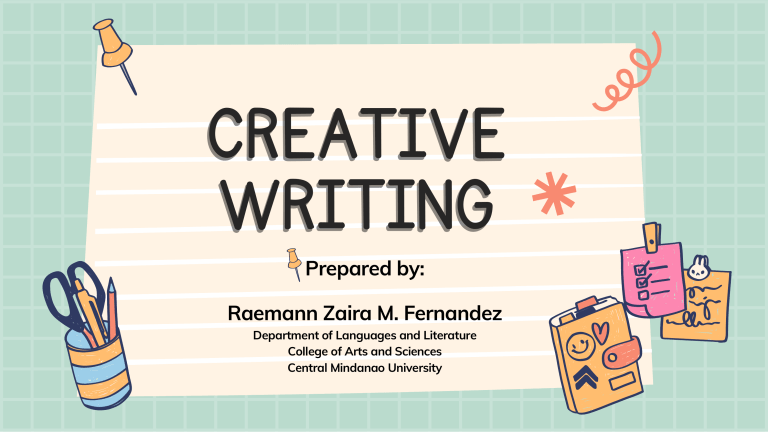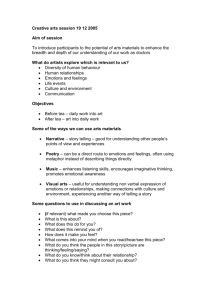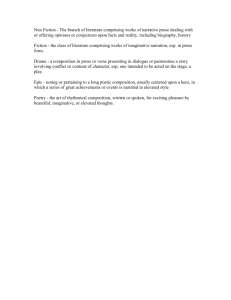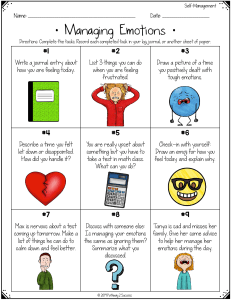
CREATIVE WRITING Prepared by: Raemann Zaira M. Fernandez Department of Languages and Literature College of Arts and Sciences Central Mindanao University LESSON 1: CREATIVE WRITING What is creative writing? prepared by rjmf LEARNING OBJECTIVES At the end of the lesson, the learners should be able to: Define creative writing Explain the nature and purpose of creative writing Identify the forms of creative writing Describe the benefits of creative writing prepared by rjmf Creative Writing “The ability to create” “Imaginative” “Productive and imaginative” “Characterized by expressiveness and originality” prepared by rjmf Creative Writing Creative writing or imaginative writing is the art of creating and recreating things, feelings, array of emotions, and thoughts through words. It is a form of writing that goes beyond the rules of professional or technical writing, and it bears the purpose of entertainment, sharing human experiences, and educating the readers. prepared by rjmf Creative writing is often defined as the writing of fiction, where the author creates events, scenes and characters, sometimes even a world. In reality, aside from instinctive utterances like the yelp of an injured child or a delighted ‘Oh!’ all expressions are creative. According to Mills (2006), in creative writing: Writers build up worlds, make them real, emphasize and illuminate them through images. Through voices they hold our attention, remind us o the varying tones of speech. Through stories told and heard they show the way our thoughts are shaped by narrative, how we shape the thoughts and lives of others and ourselves prepared by rjmf Nature and Purpose of Creative Writing The major purpose of creative writing is to express one's thoughts, feelings, and emotions. The main objective of creative writing is to share a person's anecdote and make it entertaining like loss or love. Writers get the opportunity to learn about the reality of humanity through storytelling and poetics. prepared by rjmf Nature and Purpose of Creative Writing Moreover, it is a tool in producing master pieces in literature that can be in a form of poems, short stories, novels, dramas, memoirs, television and movie script and others. With this, literature may be classified as prose and poetry according to form, or fiction and non-fiction according to structure. prepared by rjmf Nature and Purpose of Creative Writing For the purposes of this course, ‘creative writing’ is any writing that expresses events and emotions in an imaginative manner and whose primary intent is to arouse emotions. The overall intent of creative writing is not to inform. It is to stir the emotions, to elicit an emotional response. prepared by rjmf 1 FICTION It is a narrative that springs from the imagination of the writer, though it may be based on actual events and real people. 2 CREATIVE NON FICTION It is prose writing about real people, places, and events. Ex. Biographies, memoirs and essays. 3 POETRY It is a language arranged in lines. It attempts to re-create emotions and experiences. 4 DRAMA It is a writing that develops plot and character through dialogue and action. In other words, drama is literature in play form. prepared by rjmf Forms of Creative Writing Benefits of Creative Writing Self expression is the primary benefit of creative writing. It is a great way to express what you feel as it frees one's mind and comforts the soul. It is an effective platform to express one's self, one's thoughts and feelings. prepared by rjmf THOUSANDS OF JOB 1 Benefits of Creative 2 CREATIVE FREEDOM Writing Profession as a creative writer is a decent way to earn a living.. CW is an excellent career choice for those who desire to start a career in writing. It can get you access to various types of jobs online.. 3 NO TELECOMMUTING You become your own boss. CW is flexible because you decide when to work. 4 INSPIRING Writing provides an opportunity to create inspired life experiences, and helps people go through difficult moments in life. prepared by rjmf Thank you for listening! The End of Lesson 1 Prepared by: Raemann Zaira M. Fernandez Department of Languages and Literature College of Arts and Sciences Central Mindanao University prepared by rjmf


